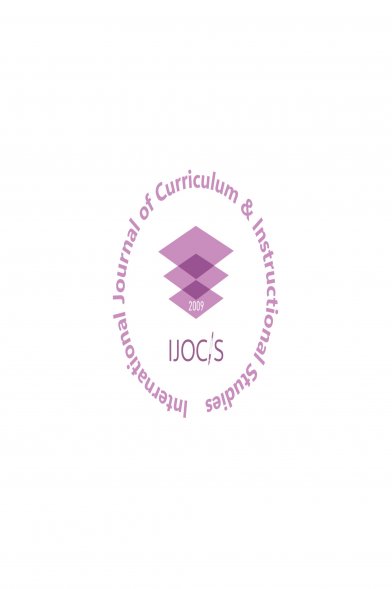Information technology teachers’ perceived roles and status
Bilişim teknolojileri öğretmenlerinin algılanan rolleri ve statüsü
___
Apple, M. W. (1995). Education and power. New York: Routledge.Au, W. (2009). High-stakes testing and discursive control: The triple bind for non-standard student identities. Multicultural Perspectives, 11(2), 65–71. http://doi.org/10.1080/15210960903028727
Aydın, S. (2014). Olgu bilim araştırma. In M. Metin (Ed.), Kuramdan uygulamaya eğitimde bilimsel araştırma yöntemleri (pp. 287–312). Ankara: PegemA Yayıncılık.
Berktay, F. (2003). Tarihin cinsiyeti. İstanbul: Metis Yayınları.
Birkök, M. C. (1994). Bilgi sosyolojisi ışığında kimlik sorunu. İstanbul Üniversitesi.
Cüre, F., & Özdener, N. (2008). Öǧretmenlerin bilgi ve iletişim teknolojileri (BIT) uygulama başarıları ve BİT’e yönelik tutumları. Hacettepe Egitim Dergisi, (34), 41–53.
Glesne, C., & Peshkin, A. (1992). Becoming qualitative researchers: An introduction (p. 6). White Plains, NY: Longman.
Güvenç, B. (1994). İnsan ve kültür. İstanbul: Remzi Kitabevi.
Hatch, J. A. (2002). Doing qualitative research in education settings. Albany, Ny: State University of New York.
Holland, D. C., Lachicotte, W. J., Skinner, D., & Cain, C. (2001). Identity and agency in cultural worlds. History. Cambridge, MA: Harvard University Press.
Köksal, D., Hortaçsu, N., & Köksal, F. (2009). Türkiye de sosyal köken, değerler ve kimlik: Türk ve Avrupa Kimliği, Proje No: 104K107. İstanbul.
Merriam, S. B. (1998). Qualitative research and case study applications in education. San Francisco: Jossey Bass.
Ni, L., & Guzdial, M. (2012). Who AM I?: Understanding high school computer science teachers’ professional identity. SIGCSE ’12: Proceedings of the 43rd ACM Technical Symposium on Computer Science Education, 499–504. http://doi.org/10.1145/2157136.2157283
Nuttman-Shwartz, O. (2017). Rethinking professional identity in a globalized world. Clinical Social Work Journal, 45(1), 1–9. http://doi.org/10.1007/s10615-016-0588-z
Öğretmen Yetiştirme ve Geliştirme Genel Müdürlüğü. (2017). Öğretmenlik mesleği genel yeterlikleri. Ankara.
Özsoy, S., Ünal, I., Özdemir, Y., Buyruk, H., & Demir, N. (2011). Türkiye’de eğitim bilimci olmak: Bir kimlik araştırması. Ankara.
Robson, J. (1998). A profession in crisis: Status, culture and identity in the further education college. Journal of Vocational Education and Training, 50(4), 585–607. http://doi.org/10.1080/13636829800200067
Sevig, T. D., Higlen, P. S., & Adams, E. M. (2000). Development and validation of the self-identity inventory (SII): A multicultural identity development instrument. Cultural Diversity and Ethnic Minority Psychology, 6, 168– 182.
Tailor, G. R. (2005). Interpreting qualitative and quantitive methods in research (2nd ed.). Maryland: University Press of America.
Tanner, J. L., & Arnett, J. J. (2009). The emergence of “‘emerging adulthood’”: The new life stage between adolescence and young adulthood. In A. Furlong (Ed.), Handbook of youth and young adulthood: New perspectives and agendas (pp. 39–47). New York, NY: Routledge.
Taylor, L. A. (2017). How teachers become teacher researchers: Narrative as a tool for teacher identity construction. Teaching and Teacher Education, 61, 16–25. http://doi.org/10.1016/j.tate.2016.09.008
Topu, F. B., & Göktaş, Y. (2012). Bilişim teknolojileri öğretmenlerinin üstlendikleri roller ve onlardan beklentiler. Kuram ve Uygulamada Eğitim Bilimleri, 12(1), 461–478.
Troman, G. (2007). Research on teachers’ work & teacher professionalism: A short history. In I. Hextall, S. Gewirtz, A. Cribb, & P. Mahony (Eds.), Changing teachers’ roles, identities & professionalism (pp. 30–49).
London, England: TLRP (Teacher and Learning Research Programme), Roehampton University, King’s College.
TDK (2018). Türk Dil Kurumu Sözlüğü. Retrieved March 8, 2018, from http://www.tdk.gov.tr/index.php?option=com_bts&arama=kelime&guid=TDK.GTS.5aa10bcda8f3d0.418746 35
Wiles, F. (2013). “Not easily put into a box”: Constructing professional identity. Social Work Education, 32(7), 854–866. http://doi.org/10.1080/02615479.2012.705273
Witzel, A., & Reiter, H. (2012). The problem-centred interview. Sage: USA, California.
Yıldırım, A., & Şimşek, H. (2005). Sosyal bilimlerde nitel araştırma yöntemleri (7th ed.). Ankara: Seçkin Yayınevi.
- ISSN: 2146-3638
- Yayın Aralığı: 2
- Başlangıç: 2011
- Yayıncı: Eğitim Programları ve Öğretim Derneği
Developing protective factor scale for classroom teachers: A validity and reliability study
NURTAÇ ÜSTÜNDAĞ, DİDEM AYDOĞAN, Ruken Akar VURAL
Teacher views on the curriculum of elementary school third grade science course
Kıta Avrupası pedagojisinde didaktik: Temelleri ve problemleri üzerine bir inceleme
The family involvement in different early childhood curricula and approaches in the world
CANSU YILDIZ, MİNE CANAN DURMUŞOĞLU
İlkokul 3. Sınıf fen bilimleri dersi öğretim programına yönelik öğretmen görüşleri
Information technology teachers’ perceived roles and status
SERDAR ÇİFTCİ, MELTEM ÇENGEL, Barış ÖZKAYA
Bilişim teknolojileri öğretmenlerinin algılanan rolleri ve statüsü
Meltem ÇENGEL, Serdar ÇİFTCİ, Barış ÖZKAYA
İlkokul öğretmenleri için koruyucu faktör ölçeği geliştirme: Geçerlik ve güvenirlik çalışması
Nurtaç ÜSTÜNDAĞ, Didem AYDOĞAN, Ruken AKAR VURAL
Didactic in Continental European pedagogy: An analysis of its origins and problems
